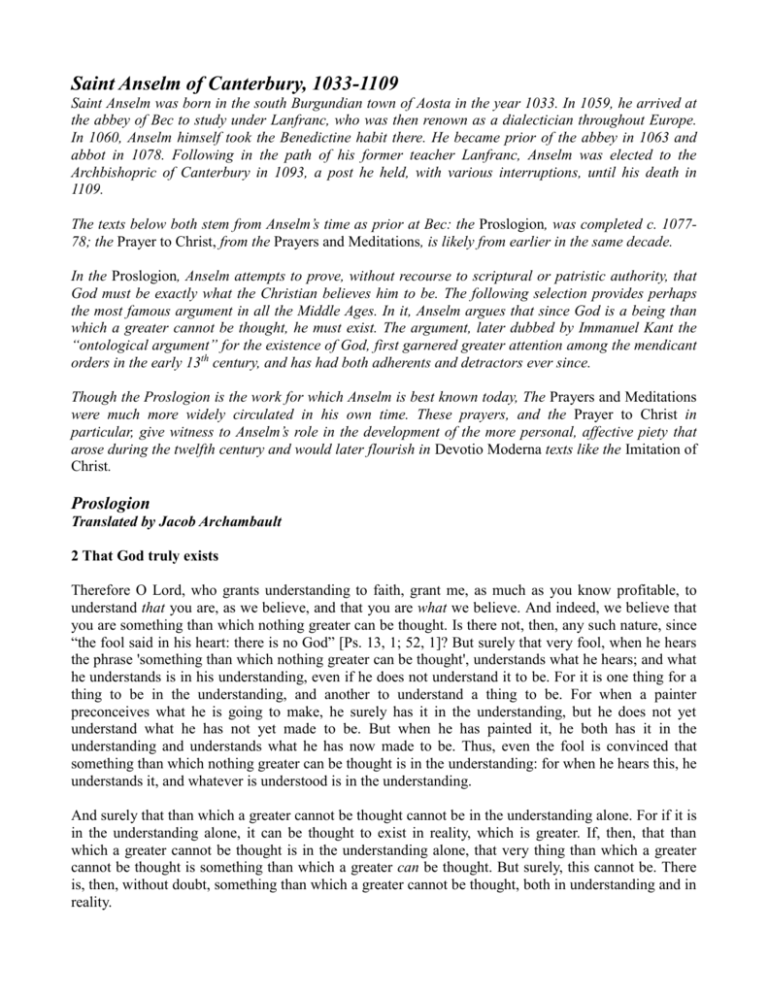Saint Anselm of Canterbury, 1033-1109
advertisement

Saint Anselm of Canterbury, 1033-1109 Saint Anselm was born in the south Burgundian town of Aosta in the year 1033. In 1059, he arrived at the abbey of Bec to study under Lanfranc, who was then renown as a dialectician throughout Europe. In 1060, Anselm himself took the Benedictine habit there. He became prior of the abbey in 1063 and abbot in 1078. Following in the path of his former teacher Lanfranc, Anselm was elected to the Archbishopric of Canterbury in 1093, a post he held, with various interruptions, until his death in 1109. The texts below both stem from Anselm’s time as prior at Bec: the Proslogion, was completed c. 107778; the Prayer to Christ, from the Prayers and Meditations, is likely from earlier in the same decade. In the Proslogion, Anselm attempts to prove, without recourse to scriptural or patristic authority, that God must be exactly what the Christian believes him to be. The following selection provides perhaps the most famous argument in all the Middle Ages. In it, Anselm argues that since God is a being than which a greater cannot be thought, he must exist. The argument, later dubbed by Immanuel Kant the “ontological argument” for the existence of God, first garnered greater attention among the mendicant orders in the early 13th century, and has had both adherents and detractors ever since. Though the Proslogion is the work for which Anselm is best known today, The Prayers and Meditations were much more widely circulated in his own time. These prayers, and the Prayer to Christ in particular, give witness to Anselm’s role in the development of the more personal, affective piety that arose during the twelfth century and would later flourish in Devotio Moderna texts like the Imitation of Christ. Proslogion Translated by Jacob Archambault 2 That God truly exists Therefore O Lord, who grants understanding to faith, grant me, as much as you know profitable, to understand that you are, as we believe, and that you are what we believe. And indeed, we believe that you are something than which nothing greater can be thought. Is there not, then, any such nature, since “the fool said in his heart: there is no God” [Ps. 13, 1; 52, 1]? But surely that very fool, when he hears the phrase 'something than which nothing greater can be thought', understands what he hears; and what he understands is in his understanding, even if he does not understand it to be. For it is one thing for a thing to be in the understanding, and another to understand a thing to be. For when a painter preconceives what he is going to make, he surely has it in the understanding, but he does not yet understand what he has not yet made to be. But when he has painted it, he both has it in the understanding and understands what he has now made to be. Thus, even the fool is convinced that something than which nothing greater can be thought is in the understanding: for when he hears this, he understands it, and whatever is understood is in the understanding. And surely that than which a greater cannot be thought cannot be in the understanding alone. For if it is in the understanding alone, it can be thought to exist in reality, which is greater. If, then, that than which a greater cannot be thought is in the understanding alone, that very thing than which a greater cannot be thought is something than which a greater can be thought. But surely, this cannot be. There is, then, without doubt, something than which a greater cannot be thought, both in understanding and in reality. 3 That this being cannot be thought to not be This being so truly is that neither can it be thought to not be. For one can think there to be something that cannot be thought to not exist; which is greater than what can be thought to not exist. Wherefore, if that than which a greater cannot be thought can be thought to not be, this very being than which a greater cannot be thought is not that than which a greater cannot be thought, which cannot come about. And so that than which a greater cannot be thought so truly is that neither can it be thought to not be. And this is you, O Lord our God. Therefore, you so truly are, Lord my God, that neither can you be thought to not be. And rightly so. For if any mind could think something better than you, the creature would ascend above the creator and would judge the creator, which is completely absurd. And indeed, anything else besides you alone can be thought to not be. You alone, then, most truly of all and therefore most of all, have being; for whatever else there is is truly not so, and therefore has less being. Why, then, has “the fool said in his heart: there is no God,” when it is so quick to the rational mind that you are most of all? Why, except because he is stupid and foolish? 4 How the fool said in his heart what he cannot think But how has the fool said in his heart what he could not think? Or how is it that he could not think what he said in his heart, since to say in one's heart and to think are the same? For if this is true – namely, that he truly thought it, since he said it in his heart, and that he did not say it in his heart, since he could not think it – then it is not in one way only that something is said to be in the heart and is thought. For a thing is thought in one way when the utterance signifying it is thought, and in another way when that which the thing itself is is understood. And so in the first way God can be thought to not be, but not at all in the second. For no one understanding what God is can think that God is not, though he may say these words in his heart, whether with or without some external indication. For God is that than which a greater cannot be thought. And whoever understands this well surely understands that very thing to be such that not even by thought does it suffer to not be. Therefore, whoever understands God to be so cannot think him to not be. I give you thanks, O Lord, I give you thanks, for what I once believed by your gift, I now understand by your illumination – so much so that if I were to refuse to believe you are, I would not be able to not understand that you are. *** Prayer to Christ when the mind fervently inclines toward his love Translated by Jacob Archambault Lord Jesus Christ, My redemption, my mercy, my salvation I praise you I give you thanks. However greatly unequal these are to your favors, However much they fall short of worthy devotion, However exceedingly thin they are compared to the desired fullness of your affection: Still such praises Such thanks, Not such as I know I owe, But as much as it can strive to give, My soul releases to you. Hope of my heart, Strength of my soul, Help of my infirmity: May you’re most powerful kindness complete What my most tepid weakness attempts. My life, Fulfillment of my purpose, Though I’ve not yet gained to love you in accordance with my debts, Yet surely do I want to love you as much as I owe. My light, you see my inmost thoughts: For lord, before you is my every longing1, And it is you who gives my soul to desire anything rightly. If what you inspire, O Lord, is good – Or rather, since it is good – Grant what you compel me to will: That I might love you! Grant that as much as you bid, So much may I merit to love you. Praise and thanks I give for the longing you’ve inspired. Praise and thanks I offer. Lest this gift remain unfruitful, Which of your own accord, you’ve given, Perfect what you’ve begun; Grant what you, in your advance kindness, Have compelled me, unworthy, to desire. Turn, O most merciful one, my lukewarmness Into most fervent love for you. Toward this, O most gentle one, This prayer, This remembrance and meditation on your favors, tends: That I might kindle your love in me. Your goodness, Lord, created me; From original sin your mercy cleansed me, your creature; After that baptismal cleansing, Wrapped in the sordid rags of my sins still, Your patience endured, nourished, awaited me. You await, good Lord, my correction; My soul awaits – To repent wholeheartedly, 1 Psa. 38:9. To live fully – Your gracious inspiration. My Lord, My Creator, My forbearer and nourishing provider, Be also my helper. I thirst for you, I hunger for you, I desire you, I sigh to you, I long for you. And just as an orphan bereaved of a most kind father’s presence, Mourning and wailing, Unceasingly, wholeheartedly clings to that beloved countenance: So also I – Not as I ought, but as I can – Remember your passion, Remember your blows, Remember your lashes, Remember your cross, Remember your wounds, I remember: How you were slain for my sake, How you were prepared for burial, How you were entombed. With these I remember your glorious resurrection and wondrous ascension. These with unwavering faith, I hold; The troubles of my exile, I mourn. I hope for your coming, my sole consolation; I yearn for your face and its glorious contemplation. Woe to me, who could not see the Lord of angels humbled to dwell among men, That he might exalt men to dwell among angels! When the stricken God was dying freely that the sinner might live, Woe that I did not merit to be dumbstruck before this piety so marvelous, So measureless! Why, O my soul, did the sword of your sharpest pain not pierce you there present, When you could not bear the lance piercing the side of your savior? When you could not watch the nail puncture the hands and feet of your maker? When you shuddered at the blood spilled by your redeemer? Why were you not drunk with bitter tears when he had drunk the bitter gall? Why did you not commiserate with that virgin most chaste, His mother most worthy, Your lady most kind, My lady most merciful: Whose springs, I’ll proclaim, erupted from eyes most pure, When you beheld your only son innocent before you Bound, Whipped, Sacrificed; Whose waves, I’ll trust, flooded that most godly face, When you looked up at Your son and God and Lord stretched faultless on the cross, And the flesh of your flesh cruelly cut by godless men; By whose sobs I’ll reckon a most pure heart shaken, When you heard: Woman, behold your son, And the disciple: Behold thy mother;2 When you accepted as a son The disciple in place of the master, The servant in place of the lord. Would that with favored Joseph I had taken my lord down from the cross, Seasoned him with spices, Placed him in the tomb, Or at least followed, That from such burial rites My observance would not be wanting. Would that with the blessed women I had trembled at the fiery vision of angels And heard the message of the Lord’s resurrection, The message of my consolation, The message much anticipated, The message much hoped for! Would, I say, that I had heard from the mouth of the angel: Do not fear, you seek Jesus, the crucified, He has risen, he is not here!3 Kindest, sweetest, most peaceful one: When will you make up to me: That I did not see that blessed incorruption of your flesh; That I did not kiss the place of those wounds, The fixtures of those nails; That I did not sprinkle those scars, Testaments to a true body, With tears of joy? Wondrous, measureless, matchless one: When will you have consoled me?4 And when will you unshackle me from my grief? For my grief shall not attain its course, As long as I am in exile from my lord. Woe to me, O Lord, woe to my soul! My life’s comforter, you departed, And did not bid me farewell; 2 Jhn 19:26-27. Mar 16:6. 4 Psa 119:82. 3 Walking along the path, you blessed your disciples, And I was not present; Raising your hands,5 you were taken up by a cloud into heaven, And I did not see; Angels promised your return, And I did not hear. What shall I say? What shall I do? Where shall I go? Where shall I seek him? Where or when shall I find him? Whom shall I ask? Who shall announce to the beloved, I am sick with love?6 The joy of my heart fails, My laughter is turned to mourning,7 My flesh and my heart fail, God of my heart, And God is my portion in eternity.8 My soul refused to be consoled9 Except by you, my sweetness. For what is for me in heaven, And what have I sought from you upon the earth?10 I want you, I hope for you, I seek you, To you my heart spoke. I sought your face, Your face, O Lord, shall I seek: Do not turn your face from me.11 Most kind lover of men, To you the poor one is abandoned, And you shall be the help to the orphan.12 My most secure support, Have mercy on this abandoned orphan. I have become a ward without a father, And my soul, like a widow. Look upon the tears of my widowhood and destitution, Which I offer to you until you return. Act now, Lord! Appear to me, and I shall be consoled; Show me your face, and I shall be saved;13 5 Luk 24:50-51 Sng 2:5. 7 Lam 5:15. 8 Psa 73:26. 9 Psa 77:2. 10 Psa 73:25. 11 Psa 27:8-9. 12 Psa 10:14 13 Psa 80:3, 7, 19 (alt.) 6 Disclose your presence, and I’ll have attained my desire; Reveal your glory, and my joy shall be complete. My soul thirsted for you, My flesh faints for you14 My soul thirsted for God, the font of life, When shall I come and appear before the face of my God? When will you come, my comforter, whom I await? O, that I should see the joy I desire! O, that I should be sated at the appearance of your glory,15 for which I hunger! O, that I should feast on the abundance of your house, for which I yearn! That you should give me to drink from the torrent of your delight, 16 for which I thirst! Meanwhile, Lord let my tears be bread day and night Until it is said to me: behold your God;17 Until I shall hear: soul, behold your bridegroom.18 Meanwhile, grant me food from my griefs, Meanwhile, grant me drink from my tears, And refreshment from my sorrows. Perhaps in the meanwhile my savior shall come, for he is good; And he shall not tarry, for he is holy; To him be glory unto the ages of ages, amen.19 14 Psa 63:1 Psa 17:15 16 Psa 36:8 (alt.) 17 Psa 42:3 18 Cf. Mat 25:6 19 Rom 11:36 15








